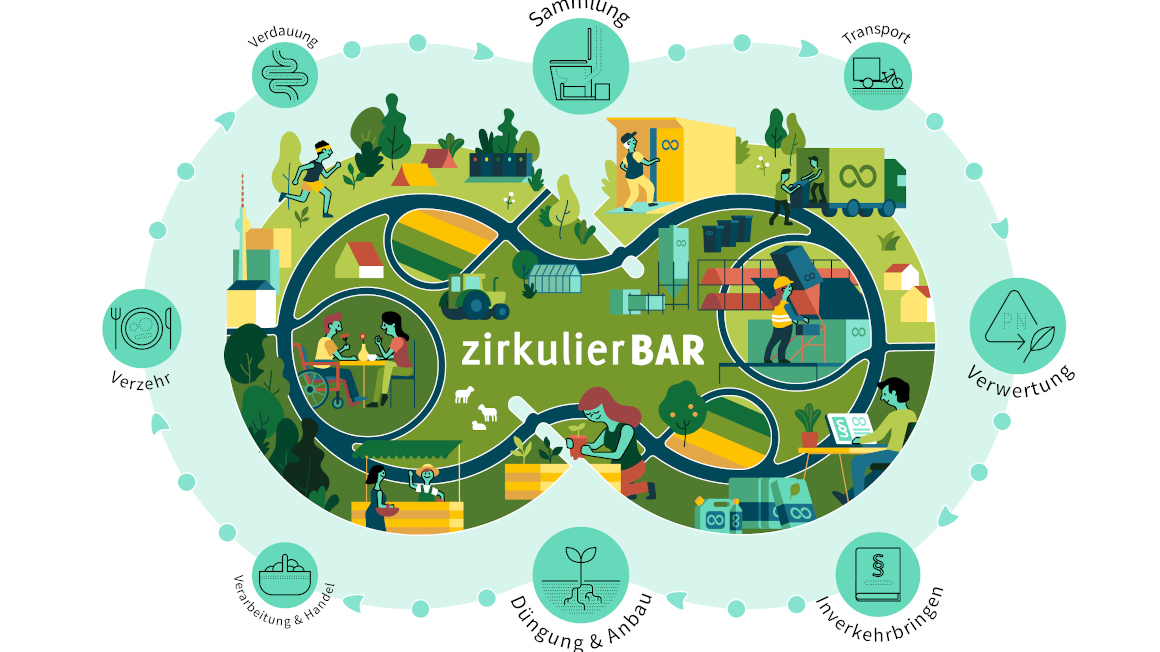Turning nutrients around with recycled fertiliser made from urine
After three years of research, the ‘zirkulierBAR’ project shows that it is technically feasible and ecologically sensible to process human excrement as fertiliser for agriculture. The results have now been published in a handbook.

How can nutrients such as phosphorus and nitrogen, which are removed from the environment through the cultivation and consumption of food, be returned? This question was the focus of the ‘zirkulierBAR’ project, which was supported by the Federal Ministry of Education and Research (BMBF) from 2021 to 2024 as part of the REGION.innovativ funding programme. Following the completion of the three-year project, which was coordinated by the Leibniz Institute of Vegetable and Ornamental Crops (IGZ), the consortium has now summarised its results and findings in a handbook.
Guidelines for the sanitary and nutrient transformation
The ‘Handbook for the sanitary and nutrient transformation’ is intended to serve as a practical guide for municipalities and farmers on the path to a circular future. Its 124 pages show how new sanitation systems and treatment plants can be used to return nutrients absorbed through food to the natural cycle. The project focused on the processing of urine and solids from dry toilets into recycled fertiliser and compost.
As part of the project, a recycling plant was set up on the premises of Stadtwerke Barnim in Eberswalde to collect and clean human excrement and process it as recycled fertiliser. It is the first of its kind in Germany. In the real-life laboratory, research was carried out into whether this type of nutrient recovery is technically feasible and also ecologically sensible. In the handbook, the researchers now describe how much potential there is in the recycled fertiliser.
Contribution to fertiliser supply and environmental protection
‘If nutrients from faeces and urine are collected and processed separately and end up on the fields in a quality-assured manner, they can make an important contribution to the supply of fertilisers,’ summarises project coordinator Ariane Krause from the Leibniz Institute of Vegetable and Ornamental Crops (IGZ). ‘We can also save water and reduce water pollution. Recycled fertilisers also reduce our dependence on imports of rock phosphate and natural gas, which are used to produce synthetic fertilisers.’
The separate processing of urine and faeces not only allows important nutrients to be recycled. According to the researchers, the recycled fertiliser can also be used to replace up to 25% of mineral fertilisers in Germany, thereby reducing the carbon footprint and pressure on natural resources such as soil, water, air and nutrients.
All the results of the BMBF-funded ‘zirkulierBAR’ project can be found in the publication: ‘Back to the cycle - Handbook for the sanitary and nutrient transformation’ (all information only available in German).
The handbook is available as a free download.
Further information can be found on the website of the ‘zirkulierBAR’ project.
The handbook will also be available in printed form from January 2025.
In the Eberswalde plant, which is operated by project partner Finizio – Future Sanitation GmbH, the solid waste from the dry toilets is turned into humus fertiliser. To do this, the solids are treated at high temperatures in a sanitisation container to remove harmful germs. The treated solids are then refined into humus fertiliser using green waste, clay minerals and biochar. The liquid components are then processed into a liquid complex fertiliser in a multi-stage process in the urine treatment plant. Here, microorganisms convert the urea contained in the urine into plant-available nutrients. Medication residues and other harmful substances are then removed using activated carbon.
Safety and effectiveness of recycled fertilisers confirmed
‘Our recycled fertilisers are safe in terms of health and epidemiological hygiene,’ emphasises project coordinator Ariane Krause. ‘They comply with the strict limits of waste and fertiliser legislation.’ The fact that the new recycled fertilisers are harmless has also been shown by tests on the field and in the greenhouse at the Eberswalde University for Sustainable Development (HNE) as well as studies by the German Biomass Research Centre (DBFZ) and the Technical University (TU) Berlin.
The project also demonstrated that the effect of the new recycled fertilisers is ‘comparable to that of other organic or synthetic fertilisers’. The fertiliser from urine in particular provides valuable nutrients for plant growth, while the fertiliser from the solids contributes to soil humus cultivation in the long term, the researchers write.
Urine treatment plant is being further developed
The urine treatment plant is now being further developed as part of the Horizon Europe project P2GreeN. The processing plant in Eberswalde will continue to be operated by the start-up Finizio in order to produce humus fertiliser and urine-based fertiliser. However, it remains to be seen if and when the new recycled fertilisers will be used in agriculture and horticulture. According to the researchers, an ‘adequate legal framework’ for alternative sanitation systems must be created in Germany.
bb


